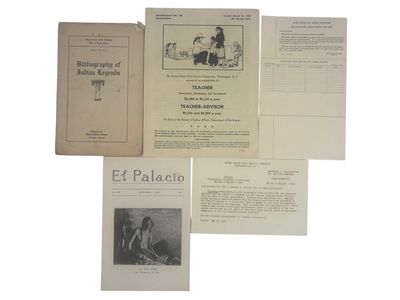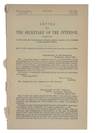by Native American , Policies
Archive of four official U.S. federal documents from the 50th Congress, relating to Native American policy in 1888, covering treaty obligations, land allotments, military service, and the status of Black freedmen in the Chickasaw Nation. Together these materials reflect the complex interplay between sovereignty, race, land, and citizenship in the post-Civil War period, illustrating the federal government's inconsistent and often coercive relationships with Native communities.
[1] Department of the Interior. Letter from the Secretary of the Interior Transmitting a Letter from the Commissioner of Indian Affairs Relative to the Freedmen in the Chickasaw Nation. 50th Congress, 1st Session, Senate Ex. Doc. No. 166. Washington: Government Printing Office, 1888. 8vo. 6pp. Details the unresolved status of Black freedmen in the Chickasaw Nation under the 1866 treaty in which the Choctaw and Chickasaw nations ceded lands to the U.S. for $300,000, with a provision to adopt freedmen as citizens or allow the U.S. to relocate them. The document states that despite repeated petitions from freedmen in 1868 and 1869, "no action was taken." A Chickasaw legislative act in 1873 offered to adopt Black residents but denied them access to communal lands or treaty benefits: "Provided further, that said adopted negroes should be subject to the jurisdiction and laws of the Chickasaw Nation just as if said negroes were Chickasaws." The U.S. failed to act on this proposal, resulting in decades of legal limbo. The Commissioner of Indian Affairs emphasized the urgency of redress: "Since then all Chickasaw action has looked towards the removal of the freedmen."
[2] U.S. House of Representatives. Indians Who Served in the Army of the United States. 50th Congress, 1st Session, Report No. 1953. Washington: Government Printing Office, 1888. 8vo. 4pp. This report recommends compensation for Sisseton and Wahpeton Sioux Indians who served the U.S. military during the Civil War against their own people, declaring it a "most pathetic plea for the relief asked for... for those who lost everything in their devotion to the whites, and who have so long suffered from the wrongs we have inflicted upon them." The report calls for back pay and annuities, amending an earlier bill to ensure proper payment to those who were scouts during the Minnesota uprising. Includes a comprehensive breakdown of trust fund obligations to various Dakota bands, revealing unpaid treaty sums totaling over $150,000. Letters from Gen. Bishop Whipple and Bishop Hare add urgency to the appeal.
[3] Department of the Treasury. Letter from the Secretary of the Treasury Transmitting an Estimate from the Secretary of the Interior of Appropriation for Fulfilling Treaties with Kickapoo Indians. 50th Congress, 1st Session, House Ex. Doc. No. 105. Washington: Government Printing Office, 1888. 8vo. 3pp. Requests an appropriation to pay treaty annuities, including interest on $32,432.44, and settlement of $100,000 at 5% interest for educational and beneficial purposes, under the May 18, 1854 treaty. Specifies payments to "seventeen Kickapoo allottees, to those who may hereafter become citizens of the United States, and to the heirs or legal representatives of deceased Kickapoo allottees." This reflects the ongoing process of allotment and forced citizenship under the Dawes Act framework.
[4] Department of the Interior. Message from the President of the United States Transmitting a Letter from the Secretary of the Interior Relative to Land Upon Which to Locate Seminole Indians. 50th Congress, 1st Session, Senate Ex. Doc. No. 120. Washington: Government Printing Office, 1888. 8vo. 4pp. President Grover Cleveland submits a report on the failure to secure lands for Seminoles displaced in Florida. A special agent's report from 1887 describes efforts to locate Seminole homesteads under the $6,000 appropriation authorized in 1884, ultimately finding the effort unworkable. The report laments: "The great need of educational facilities for these younger Indians remains unmet." Agent J.M. Wilson states that the absence of public land and the hostility of white settlers rendered resettlement plans impractical, and that Seminoles were "unable to find any vacant available lands upon which to locate." It concludes that federal efforts to relocate Seminoles in Florida had failed, reinforcing their isolation and poverty in the Everglades.
All items disbound from Congressional volumes, with stab holes and some edge wear; faint toning throughout. Overall good condition. (Inventory #: 22379)
[1] Department of the Interior. Letter from the Secretary of the Interior Transmitting a Letter from the Commissioner of Indian Affairs Relative to the Freedmen in the Chickasaw Nation. 50th Congress, 1st Session, Senate Ex. Doc. No. 166. Washington: Government Printing Office, 1888. 8vo. 6pp. Details the unresolved status of Black freedmen in the Chickasaw Nation under the 1866 treaty in which the Choctaw and Chickasaw nations ceded lands to the U.S. for $300,000, with a provision to adopt freedmen as citizens or allow the U.S. to relocate them. The document states that despite repeated petitions from freedmen in 1868 and 1869, "no action was taken." A Chickasaw legislative act in 1873 offered to adopt Black residents but denied them access to communal lands or treaty benefits: "Provided further, that said adopted negroes should be subject to the jurisdiction and laws of the Chickasaw Nation just as if said negroes were Chickasaws." The U.S. failed to act on this proposal, resulting in decades of legal limbo. The Commissioner of Indian Affairs emphasized the urgency of redress: "Since then all Chickasaw action has looked towards the removal of the freedmen."
[2] U.S. House of Representatives. Indians Who Served in the Army of the United States. 50th Congress, 1st Session, Report No. 1953. Washington: Government Printing Office, 1888. 8vo. 4pp. This report recommends compensation for Sisseton and Wahpeton Sioux Indians who served the U.S. military during the Civil War against their own people, declaring it a "most pathetic plea for the relief asked for... for those who lost everything in their devotion to the whites, and who have so long suffered from the wrongs we have inflicted upon them." The report calls for back pay and annuities, amending an earlier bill to ensure proper payment to those who were scouts during the Minnesota uprising. Includes a comprehensive breakdown of trust fund obligations to various Dakota bands, revealing unpaid treaty sums totaling over $150,000. Letters from Gen. Bishop Whipple and Bishop Hare add urgency to the appeal.
[3] Department of the Treasury. Letter from the Secretary of the Treasury Transmitting an Estimate from the Secretary of the Interior of Appropriation for Fulfilling Treaties with Kickapoo Indians. 50th Congress, 1st Session, House Ex. Doc. No. 105. Washington: Government Printing Office, 1888. 8vo. 3pp. Requests an appropriation to pay treaty annuities, including interest on $32,432.44, and settlement of $100,000 at 5% interest for educational and beneficial purposes, under the May 18, 1854 treaty. Specifies payments to "seventeen Kickapoo allottees, to those who may hereafter become citizens of the United States, and to the heirs or legal representatives of deceased Kickapoo allottees." This reflects the ongoing process of allotment and forced citizenship under the Dawes Act framework.
[4] Department of the Interior. Message from the President of the United States Transmitting a Letter from the Secretary of the Interior Relative to Land Upon Which to Locate Seminole Indians. 50th Congress, 1st Session, Senate Ex. Doc. No. 120. Washington: Government Printing Office, 1888. 8vo. 4pp. President Grover Cleveland submits a report on the failure to secure lands for Seminoles displaced in Florida. A special agent's report from 1887 describes efforts to locate Seminole homesteads under the $6,000 appropriation authorized in 1884, ultimately finding the effort unworkable. The report laments: "The great need of educational facilities for these younger Indians remains unmet." Agent J.M. Wilson states that the absence of public land and the hostility of white settlers rendered resettlement plans impractical, and that Seminoles were "unable to find any vacant available lands upon which to locate." It concludes that federal efforts to relocate Seminoles in Florida had failed, reinforcing their isolation and poverty in the Everglades.
All items disbound from Congressional volumes, with stab holes and some edge wear; faint toning throughout. Overall good condition. (Inventory #: 22379)



















